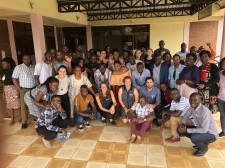Spark MicroGrants Hosts Visitors in Rwanda From 7 Countries to Learn From the Inzire Y'Itirambere Process

NEW YORK, September 17, 2019 (Newswire.com) - Spark MicroGrants is changing the game when it comes to community development. Earlier this month, partners from seven countries came together in Kigali, Rwanda to learn about their unique approach to community-driven development through the Rwandan Inzire Y’Itirambere / Facilitated Collective Action Process (FCAP). Participants routinely commented about international aid trends and donor agencies that impose top-down development strategies. Spark has developed a unique approach to community-driven development that challenges prescriptive aid, where the decision-making power is in the hands of the communities they serve. This FCAP is being implemented in various countries across Africa and is now starting to spread globally. Spark trains and consults other organizations and local government to implement their model, which is a streamlined process that facilitates community meetings and discussions, where community members design and plan their own social impact projects, and then a microgrant is provided to the community to implement their chosen project. This cost-effective method is high-impact, with 91% project sustainability. Due to its success across over 260 communities in Uganda, Rwanda, and Burundi, where Spark operates, it is now gaining demand from leading civil society groups and governments the world over.
Spark’s partners from Uganda, Rwanda, Burundi, Ghana, Liberia, Nigeria, and Puerto Rico arrived in Kigali for the annual FCAP Summit to share learning about using the FCAP in their regions. This is the first practitioner-focused Community of Practice for groups actively engaging communities in a facilitated collective action process. Much like education, health and tech have conferences to discuss best practices, shared KPIs and new research, the FCAP Community of Practice serves as such a body for organizations facilitating collective action at the village or neighborhood level.
On the second day of the conference, participants had the opportunity to observe a village meeting in Rwanda. Visitors witnessed what an FCAP community meeting looked like in Rwanda and how to foster an environment where a representative group of community members can come together to make collective decisions on village planning. A community development organization from Puerto Rico, La Marana, who attended the conference to learn more about the FCAP claimed that, “Spark MicroGrants [has] been a huge inspiration in our work,” as they implement community-driven development projects post-hurricane Maria.
One sentiment remained strong throughout the duration of the summit: communities deserve the right to drive local change, not sit as bystanders to prescriptive aid and companies that impose themselves. The next FCAP summit will take place in August 2020 on Spark’s 10 year anniversary.
Source: Spark MicroGrants